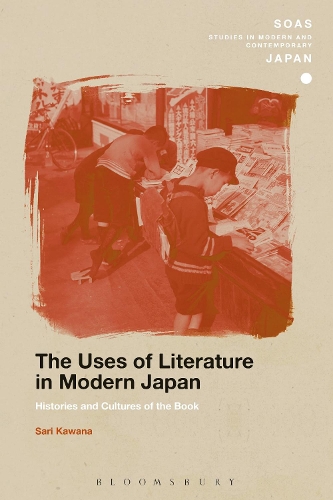
The Uses of Literature in Modern Japan: Histories and Cultures of the Book
(Paperback)
Available Formats
Publishing Details
The Uses of Literature in Modern Japan: Histories and Cultures of the Book
By (Author) Sari Kawana
Bloomsbury Publishing PLC
Bloomsbury Academic
22nd August 2019
United Kingdom
Classifications
Tertiary Education
Non Fiction
Biography, Literature and Literary studies
Social and cultural history
895.6509355
Physical Properties
Paperback
288
Width 156mm, Height 234mm
413g
Description
The Uses of Literature in Modern Japan explores the varying uses of literature in Japan from the late Meiji period to the present, considering how creators, conveyors, and consumers of literary content have treated texts and their authors as cultural resources to be packaged, promoted, and preserved. As the printed word became a crucial form of entertainment and edification for an increasingly literate public in early 20th-century Japan, literature came to assume a variety of new uses. Touching upon a wide array of sources, Sari Kawana traces the ways in which literary works have morphed into different variants, ranging from textual (compilations, textbooks) and visual (film, manga, other media) to virtual and real world, through innovative publishing and reading practices. She takes up themes such as the materiality of texts, the role of publishers and advertising campaigns, the interplay between literature and other media, and the creation and dissemination of larger cultural fantasies tied to literary consumption. She stresses the agency and creativity with which readers engaged literary works, from divergent readings of propaganda literature to inventive adaptations of canonical texts in adjacent media, culminating in the practice of literary tourism. Moving beyond close reading of texts to look at their historical context, the book will appeal not only to scholars of modern Japanese literature but also those studying the history of the book and modern Japanese cultural history.
Reviews
The Uses of Literature in Modern Japan is a worthy contribution to scholarship on the book as media. It draws on media theory and the work of many scholars writing in English and Japanese and extends their work into new arenas [An] engaging work that will impact continued research on the book and literature as media This is an intriguing study with significant implications for future scholarship. * Journal of Japanese Studies *
[An] important step in bridging the fields of Japanese literary criticism and book history in English [This] book identifies a unique perspective on modern and contemporary literature and literary history. * East Asian Publishing and Society *
In the ongoing debates over the hows and whys of canon formation, Kawanas portrayal of canons as dynamic, fluid constructs rather than enduring monuments or oppressive but arbitrary inventions is a breath of fresh air. * Japan Review *
With the forensic skills of a literary detective, Sari Kawana uncovers new insights behind the production, packaging, and persistence of many modern Japanese classics. This innovative study takes scholarship on modern Japanese literature in exciting new directions. * Rebecca Copeland, Professor of Japanese Language and Literature, Washington University in St. Louis, USA *
A masterful contribution to the fields of modern Japanese literature and modern Japanese history, Kawanas expertly researched and persuasively argued The Uses of Literature in Modern Japan reveals stunning new insights into the production, promotion, and pervasiveness of twentieth- and twenty-first century Japanese literature and its varied inter-media adaptations and translations in Japan and well beyond. Covering impressive ground, this book makes a compelling case for the continued economic and social relevance of literature. * Karen Thornber, Professor of Comparative Literature and of East Asian Languages and Civilizations, Harvard University, USA *
Author Bio
Sari Kawana (1973-2020) was Professor of Japanese at the University of Massachusetts Boston, USA. She was the author of Murder Most Modern: Detective Fiction and Japanese Culture (2008).
